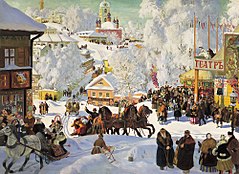| Maslenitsa | |
|---|---|
 | |
| Also called | Butter Week, Crepe week, Cheesefare Week, Syropust, Kolodiya, Masnytsia |
| Observed by | Eastern Slavs Mostly Russia, Ukraine and Belarus, as well as Russian, Ukrainian and Belarusian diaspora communities |
| Type | Ethnic |
| Significance | Seeing off winter, last week before Great Lent |
| Celebrations | Making blini (crepes), making visits, sleigh rides, dressing up, bonfires, snowball fights, the capture of the Snow Fortress, burning of the Maslenitsa Scarecrow In Ukraine and Belarus: eating varenyky with cottage cheese |
| 2023 date | 20 February to 26 February |
| 2024 date | 11 March to 17 March |
| 2025 date | 24 February to 2 March |
| Frequency | Annual |
| Related to | Mardi Gras |
Maslenitsa (Belarusian: Масленіца; Russian: Мaсленица; Rusyn: Пущаня; Ukrainian: Масляна or Масниця), also known as Butter Lady, Butter Week, Crepe week, or Cheesefare Week, is an Eastern Slavic religious and folk holiday which has retained a number of elements of Slavic mythology in its ritual. It is celebrated during the last week before Great Lent; that is, the eighth week before Eastern Orthodox Pascha.
The date of Maslenitsa changes every year, depending on the date of the celebration of Easter. It corresponds to the Western Christian Carnival, except that Orthodox Lent begins on a Monday instead of a Wednesday, and the Orthodox date of Easter can differ greatly from the Western Christian date.
The traditional attributes of the Maslenitsa celebration are the Maslenitsa effigy, sleigh rides, and festivities. Russians bake bliny and flatbread, while Belarusians and Ukrainians cook pierogi and syrniki.